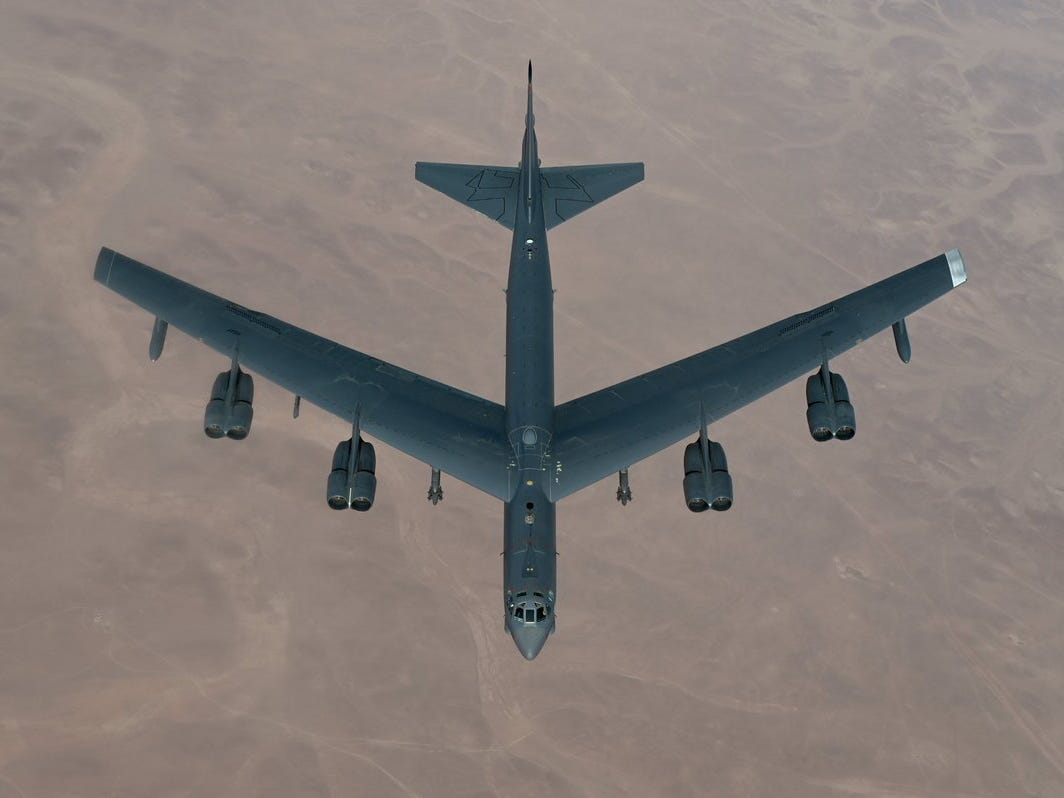-
American warplanes pounded Syria with airstrikes as the Assad regime fell on Sunday.
-
They hit dozens of targets in support of the anti-ISIS mission, which officials say will continue.
-
The US isn’t the only military conducting strikes amid the uncertain situation in Syria.
The US military has carried out extensive airstrikes in Syria since the Assad regime collapsed over the weekend, and it’s not the only country on the hunt for targets in this uncertain moment.
American, Israeli, and Turkish forces have all been involved in bombing targets across Syria over the past few days in actions said to be in support of their respective national security interests.
For the US, this means continuing to go after the Islamic State, as it has done for years, but with an intensity to keep the group at bay. The Biden administration has stated that this mission will continue despite uncertainty about the future of Syria’s leadership.
The US has repeatedly said that it is committed to the enduring defeat of ISIS. “We don’t want to give ISIS an opportunity to exploit what’s going on,” White House National Security Council spokesperson John Kirby told reporters on Tuesday, adding, “They love nothing more than ungoverned space.”
Widespread military action in Syria
As rebel forces reached Damascus on Sunday and Syrian President Bashar Assad fled the country, US Air Force B-52 bombers, F-15 fighter jets, and A-10 attack aircraft bombed ISIS targets in central Syria. The widespread strikes hit the terrorist group’s leaders, operatives, and camps, said US Central Command, which oversees Middle East operations.

F-15 Strike Eagles, like the one pictured above, took part in the widespread strikes against ISIS over the weekend.US Air Force photo
A senior administration official, speaking to reporters, described the combat operation as “significant” and said the American warplanes dropped around 140 munitions to hit 75 targets. The US military said the goal of the strikes was to prevent ISIS from reconstituting in central Syria.
Jonathan Lord, a former political-military analyst at the Pentagon, told Business Insider the US military is “rightly worried that ISIS could slip through the cracks in the chaos,” so it is hitting as many targets as possible.
Retired Gen. Joseph Votel, who oversaw US military operations in the Middle East in the 2010s as the Centcom commander, told BI that it’s “good” the US is sending a clear message and taking action to prevent ISIS from exploiting the void in central Syria.
He added that it’s important for the US to maintain a small presence in eastern Syria, calling it “a very effective and efficient way to keep tabs on this threat.”
The widespread bombing since Sunday has, however, not been limited to just US actions. Israel has carried out over 300 airstrikes across neighboring Syria, according to the UK-based Syrian Observatory for Human Rights, a war monitor.
Israel has targeted the remnants of Assad’s former military, including aircraft, ammunition depots, weapons storage facilities, warships, radar systems, and additional assets, the SOHR said. Israeli officials have said these strikes are intended to prevent weaponry from falling into the hands of potential foes.

A Syrian naval ship, destroyed in an overnight Israeli attack, is pictured in the port city of Latakia on December 10.AAREF WATAD/AFP
“Israel is taking no chances with their security and not waiting to find out if the new Syrian government is friendly or hostile,” said Lord, who is now the director of the Middle East Security program at the Center for a New American Security think tank.
The Israeli military has also sent its ground forces across the Syrian border beyond a United Nations-monitored buffer zone that separates the two countries. The UN has criticized the move, which Israel said is a measure to protect its citizens amid the uncertainty in Damascus.
Avi Melamed, a former Israeli intelligence official, told BI that the actions are a “combined effort to try to minimize as much as possible the risk of growing military challenges following the current situation in Syria.”
He said the Israeli approach likely includes diplomatic efforts to complement the airstrikes and buffer zone operation.
Meanwhile, a Turkish drone attacked a military site in an area held by the Kurdish-led Syrian Democratic Forces, the SOHR said on Tuesday. Ankara, which views the nearby SDF as a terror group, has targeted Kurdish forces for years. The US frequently works closely with the SDF on counter-ISIS operations.

Turkish military armored vehicles arrive at a checkpoint at the Turkey-Syria border on December 9.AP Photo/Metin Yoksu
“The Turks have a legitimate counter-terrorism threat that they, too, have a right to deal with,” Kirby, the White House spokesperson, said in response to a reporter’s question about action against Kurdish groups.
The widespread military actions come on the heels of the shock collapse of the Syrian Army amid a stunning, only dayslong rebel offensive that removed Assad from power. The longtime dictator had relied extensively on military support from Russia, Iran, and Lebanese Hezbollah to keep opposition forces in check.
US officials are blaming the fall of the Assad regime on the reality that these three actors have been weakened and distracted lately by their respective conflicts with Ukraine and Israel. Russia, in particular, used to exercise significant control over Syrian airspace, but the future of Moscow’s military footprint in the country is now unclear.
Read the original article on Business Insider















